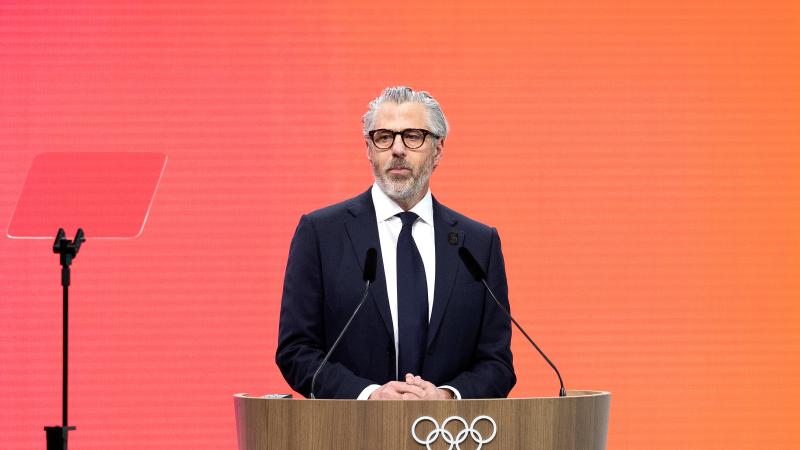Comey's media mole told FBI he shaped Russia narrative, needed ‘discount’ to deny leaking intel
The FBI confirmed illegal intel leaks but rounded up no offenders. Declassified memos have unmasked Comey's secret media conduit, a law professor whom Comey put on the government payroll.
The FBI concluded numerous legacy news media stories that crafted the false Russia collusion narrative contained illegally leaked classified intelligence but failed to definitively identify the leakers. But agents did force a stunning admission that ex-FBI Director James Comey used a special conduit to the Pulitzer Prize-winning New York Times in his bid to polish his image and push for a special prosecutor to take down President Donald Trump.
Columbia University law professor Daniel Richman admitted to agents in interviews he routinely communicated on behalf of Comey, his longtime friend, with Times reporter Michael Schmidt, whose work was among the newspaper's 2018 Pulitzer-winning stories on Russian election interference. The goal, Richman told the FBI, was "to correct stories critical of Comey, the FBI and to shape future press coverage" outside of the bureau's official press office, according to internal FBI memos that current Director Kash Patel delivered to Congress this week.
While Richman was known to have been publicly quoted in news stories as an advocate for Comey, he admitted to agents — who were part of the FBI’s Arctic Haze classified leaks inquiry — that he was given access by Comey to what turned out to be highly classified information up to the SCI level and sometimes provided information to reporters on an anonymous basis.
Richman insisted he did not believe he had confirmed or provided classified intelligence to reporters but said he could not be 100 percent, the memos state, noting he could only make his leak denial “with a discount.”
"Richman was pretty sure he did not confirm the Classified Information. However, Richman told the interviewing agents he was sure 'with a discount' that he did not tell Schmidt about the Classified Information," one FBI memo recounted.
In the end, the Justice Department decided not to pursue any criminal charges against Comey or any of his lieutenants or now-Sen. Adam Schiff despite potential evidence of leaks, saying it could not be certain of who leaked what and when.
But its interrogation of Richman and his admissions of significant contact with the Times' Schmidt provide the most detailed account to date of how Trump critics like Comey — who was fired by the president — used the media to craft narratives that ultimately turned out to be untrue or misleadingly overstated, the memos show.
You can read the FBI's Arctic Haze memos here:
FBI Memos - Arctic Haze - Classified Leaks Investigation
Schmidt did not immediately respond to a request for comment sent to him as a direct message on Twitter/X. Richman did not immediately respond to a request for comment sent to him through his Columbia University email. Comey did not immediately respond to a request for comment sent to him through his book website.
Just the News also revealed this week that a career intelligence officer who worked for Democrats on the House Intelligence Committee for more than a decade repeatedly warned the FBI beginning in 2017 that then-Rep. Adam Schiff had approved leaking classified information to smear then-President Donald Trump over the now-debunked Russiagate scandal. Schiff has denied the allegation.
Newly-declassified FBI memos also include details on classified leaks investigations dubbed Tropic Vortex, Foggy Falls, Riding Hood, Sirens Lure, Echos Fate, and Genetic Christmas.
Comey, Richman, and “Arctic Haze”
The FBI leak investigation code-named “Arctic Haze” revealed key details about Richman — Comey’s longtime friend, confidante, and media conduit — including what was at that time his nearly decade-long source relationship with Michael Schmidt of The New York Times.
The leak investigation zeroed in on four news articles which contained leaked classified information.
The first was a New York Times article by four reporters — Schmidt, Matt Apuzzo, Adam Goldman, and Eric Lichtblau — from late April 2017 titled “Comey Tried to Shield the F.B.I. from Politics. Then He Shaped an Election.” The second was a Washington Post story by Ellen Nakashima from early April 2017 titled “New details emerge about 2014 Russian hack of the State Department: It was ‘hand to hand combat’.”
The third was another Washington Post piece by Karoun Demirjian and Devlin Barrett from late May 2017 titled, “How a Dubious Russian Document Influenced the FBI’s Handling of the Clinton Probe.” The fourth was a Wall Street Journal article by Holman Jenkins Jr. from late May 2017 titled, “The Trump-Russia Story Starts Making Sense.”
The April 2017 Times article by Schmidt quoted Richman defending Comey: “Jim sees his role as apolitical and independent. The F.B.I. director, even as he reports to the attorney general, often has to stand apart from his boss.”
Schmidt wrote that “confidants like Mr. Richman say he was constrained by circumstance” while “navigating waters in which every move has political consequences.” Richman also reportedly said that Comey displayed “a consistent pattern of someone trying to act with independence and integrity, but within established channels” and that “his approach to the Russia investigation fits this pattern.”
The Times article wrongly argued that, in the case of the Trump-Russia investigation, Comey “conducted the investigation by the book.”
The FBI memos show that Arctic Haze was opened by the FBI’s Washington Field Office as a media leak investigation in mid-August 2017, after a redacted source in late June 2017 “reported the unauthorized disclosure of classified information in eight articles published between April and June 2017” and after a DOJ request at the start of August 2017. Arctic Haze was predicated on the four aforementioned stories.
The FBI closed the investigation in early September 2021 — with the DOJ charging no one with leaking classified material — with the bureau’s closure document providing details about the FBI’s failed attempt to catch the leakers. The bureau document indicated that it had been treated as an “Espionage Investigation.”
The FBI said the “factual predication” for the leak inquiry was largely based on the classified information which first appeared in the April 2017 Times piece.
The FBI noted that Comey had “publicly indicated on several occasions that classified information contributed to his decision” to unilaterally and preemptively announce in early July 2016 that he did not believe any reasonable prosecutor would charge Hillary Clinton over her mishandling of classified information on a private email server and his further announcement in October 2016 that the Clinton emails investigation was (briefly) being reopened.
The bureau said Comey had four reasons for making the announcements the way he did, including that “Comey had concerns the Classified Information, which directly related to whether or not the Attorney General [Loretta Lynch] should have been recused from the Midyear Exam investigation, would be leaked to the media or would otherwise be disclosed.”
Comey had told the Senate Intelligence Committee in July 2017 that “one significant item I can’t, I know the committee’s been briefed on. There’s been some public accounts of it, which are nonsense, but I understand the committee’s been briefed on the classified facts.” The bureau said that, in classified testimony to a bureau watchdog, “Comey confirmed the specific Classified Information, which was discussed in the New York Times article, and indicated it did impact his decision to make unilateral, public statements about the Midyear Exam [Clinton] investigation.”
Recent declassifications provide more details on the classified intelligence which swayed Comey to let Clinton off the hook, as well as revealed more information on so-called Clinton Plan intelligence which the Comey FBI seemed to ignore as it launched the Crossfire Hurricane investigation into Trump.
Comey hires Richman to afford him Top Secret Clearance
The FBI said that “Comey instructed the FBI to hire Richman as a Special Government Employee (SGE)” in 2015 and “to grant him a Top Secret clearance with access to Sensitive Compartmented Information” and that “FBI records indicated Richman was hired to work on ‘Going Dark’ matters.” The bureau said its investigation “revealed Comey also hired Richman so Comey could discuss sensitive matters, including classified information, with someone outside of the FBI’s regular leadership. Comey also used Richman as a liaison to the media.”
“The investigation revealed Richman had been a source for Michael Schmidt, one of the reporters credited with writing the article at issue, and The New York Times since at least 2008,” the bureau wrote. “Richman first spoke with Schmidt regarding an investigation into illegal activity in sports. Prior to Richman becoming an SGE, Schmidt visited Richman’s house numerous times. The New York Times quoted Richman several times, both on the record and on background, in stories regarding Jim Comey. After he was terminated by President Trump, Comey used Richman as a conduit to convey to the media memoranda of his meetings with President Trump.”
“According to Richman, Comey and Richman talked about the ‘hammering’ Comey was taking from the media concerning his handling of the Midyear Exam investigation. Richman opined Comey took comfort in the fact Richman had talked to the press about his feelings regarding Comey’s handling and decision-making on the Midyear Exam investigation. Richman claimed Comey never asked him to talk to the media,” the FBI notes say.
The FBI wrote that “Richman recalled Comey told him there was some weird classified material related to Lynch which came to the FBI’s attention” and that “Comey told Richman about the Classified Information, including the source of the information.”
The FBI said that “investigators learned that FBI Office of Public Affairs was told to assist The New York Times with the April 2017 article” and that “Comey either directed or otherwise authorized FBI’s official assistance to The New York Times.”
Disgraced and fired FBI special agent Peter Strzok and former FBI lawyer Lisa Page, with whom Strzok was having an affair, appear to have been involved in briefing the Times, according to the bureau memos.
“Strzok stated he believed FBI Executive Management told them to meet with the New York Times. Strzok said he recalled being told to provide an investigator-level briefing on the Midyear Exam investigation,” the FBI said. “During the March 30, 2017, meeting, the Times told Strzok and Page they had the Classified Information.”
The “summary of investigative steps” by the FBI included interviews with bureau and intelligence community officials, document reviews, phone and email records researches, the review of a 2017 “Tropic Vortex” investigation conducted by then U.S. Attorney John Durham and the U.S. Postal Inspection Service, and more.
“Based upon discussions with DOJ, these investigative steps did not generate sufficient proof to charge any individual with willfully transmitting the Classified Information, conspiring to transmit the Classified Information, or aiding and abetting another person’s Transmission,” the FBI concluded in 2021.
The FBI claimed that “the investigation has not yielded sufficient evidence to criminally charge any person, including Comey or Richman, with making false statements or with the substantive offenses under investigation.”
Inspector General calls Comey's leaks "unauthorized"
DOJ inspector general Michael Horowitz wrote a report released in August 2019 criticizing Comey’s decision to leak his so-called “Comey Memos” — including details about Trump’s alleged comments about Lt. Gen. Mike Flynn — to the media in 2017 in an effort by the then-fired FBI director to spur the appointment of a special counsel.
Horowitz wrote that his investigation “interviewed 17 witnesses, including former Director Comey and Daniel Richman, the individual who, at Comey's request, shared the contents of one of the Memos with a reporter [Schmidt] for The New York Times.” Comey told Horowitz that the day after being fired by Trump, he retained Richman as an attorney.
“We have previously faulted Comey for acting unilaterally and inconsistent with Department policy,” the DOJ watchdog wrote. “Comey’s unauthorized disclosure of sensitive law enforcement information about the Flynn investigation merits similar criticism.”
Comey admitted in 2017 that he had hoped leaking this information “might prompt the appointment of a special counsel.” Horowitz concluded Comey’s leaks were “an attempt to force the Department to take official investigative actions.”
“Comey had several other lawful options available to him to advocate for the appointment of a special counsel, which he told us was his goal in making the disclosure,” Horowitz wrote. “What was not permitted was the unauthorized disclosure of sensitive investigative information, obtained during the course of FBI employment, in order to achieve a personally desired outcome.”
Horowitz sent a criminal referral to the DOJ over Comey’s memos at the time, but the DOJ declined to prosecute.
Comey’s leak efforts were successful, however, as Robert Mueller was appointed special counsel within days of the Comey Memo leaks making their way to the New York Times.
An article in the Times penned by Schmidt was titled “Comey Memo Says Trump Asked Him to End Flynn Investigation” and was published on May 16, 2017. Then-Deputy Attorney General Rod Rosenstein appointed Mueller as special counsel the next day.
After two years, Mueller “did not establish” any criminal Trump-Russia collusion.
Other classified leaks inquiries also come up short
The newly-declassified FBI memos also detail a host of other failed or botched classified leaks investigations that made their way into legacy media. They were given operational code names such as Tropic Vortex, Foggy Falls, Riding Hood, Echos Fate, and Genetic Christmas.
-
Tropic Vortex
he Justice Department’s Tropic Vortex classified leaks investigation focused on an unspecified October 2016 article by The New York Times as well as an early March 2017 article written by Times reporters Schmidt and Michael Shear and titled, “Comey Asks Justice Dept. to Reject Trump’s Wiretapping Claims.”
-
Foggy Falls
The FBI’s Foggy Falls classified inquiry focused on a Washington Post article by three reporters — Ellen Nakashima, Devlin Barrett, and Adam Entous — from mid-April 2017 titled, "FBI obtained FISA warrant to monitor former Trump adviser Carter Page.”
The bureau’s Riding Hood investigation included a main focus on a Buzzfeed News article from early April 2017 written by Ali Watkins and titled, “A Former Trump Adviser Met With A Russian Spy.” The FBI speculated that the classified information in that article may have informed a mid-April 2017 story by the Washington Post written by three reporters — Ellen Nakashima, Devlin Barrett, and Adam Entous — and titled, "FBI obtained FISA warrant to monitor former Trump adviser Carter Page.”
-
Siren's Lure
The FBI’s unsuccessful Sirens Lure classified inquiry focused on three Washington Post stories. The first was one by four reporters — Matt Zapotosky, Sari Horwitz, Devlin Barrett, and Adam Entous — from late May 2017 titled, "Jared Kushner Now a Focus in Russia Investigation.” The second was an article by three reporters — Ellen Nakashima, Adam Entous, and Greg Miller — from late May 2017 titled, "Russian Ambassador Told Moscow that Kushner Wanted Secret Communications Channel with Kremlin.” The third was a piece by four reporters — David Filipov, Amy Brittain, Rosalind Helderman, and Tom Hamburger — from early June 2017 titled, "Explanations for Kushner's Meeting with Head of Kremlin-linked Bank Don't Match Up.”
-
Echos Fate
The bureau’s Echos Fate classified leaks inquiry focused on two Washington Post stories. The first one mentioned by the FBI was a mid-January 2017 story by David Ignatius originally titled “Four burning questions on Russia” which was renamed “Why did Obama dawdle on Russia’s hacking?” The second was by three reporters — Greg Miller, Adam Entous, and Ellen Nakashima — published in early February 2017 and titled, “Officials Say Flynn Discussed Sanctions.”
-
Genetic Christmas
The FBI’s failed Genetic Christmas classified leaks investigation focused on an NBC News article written by three reporters — William Arkin, Ken Dilanian, and Cynthia McFadden — which was published in mid-December 2016 and was titled, “U.S. Officials: Putin Personally Involved in U.S. Election Hack.”
Series of leaks fed "blatantly false" information to media
Director of National Intelligence Tulsi Gabbard recently harshly criticized this specific leak to NBC News, as well as one to The Washington Post, arguing that they fed a false narrative that the intelligence community had already reached a conclusion on Russian leader Vladimir Putin’s intentions during the 2016 election when the Obama-ordered Intelligence Community Assessment had not yet been completed.
“Deep State officials in the IC begin leaking blatantly false intelligence to the Washington Post, as proven by the unpublished PDB and previous IC products, claiming that Russia used ‘cyber means’ to influence ‘the outcome of the election.’ … Another leak to the Washington Post falsely alleges that the CIA ‘concluded in a secret assessment that Russia intervened’ in the election to help President Trump,” the Gabbard-led Office of the Director of National Intelligence assessed last month.
ODNI added: “At this point, there is no official IC assessment that contains that conclusion [...] IC officials again leak to the media, this time claiming [to NBC News] that IC officials believe ‘with a high level of confidence’ that Russian President Vladimir Putin was personally involved in the ‘U.S. Election Hack’.”
The Facts Inside Our Reporter's Notebook
Links
- article
- story
- piece
- article
- quoted
- told
- let Clinton off the hook
- Clinton Plan intelligence
- a report
- wrote
- penned
- appointed
- did not establish
- Trump-Russia collusion.
- titled
- article
- article
- story
- first
- article
- piece
- originally titled
- renamed
- titled
- article
- harshly criticized
- assessed
- publicly endorsed












